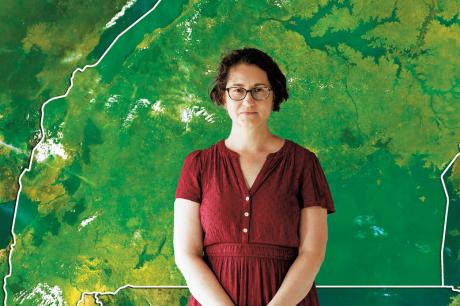
From left to right, students Arthi Vaidyanathan and Muhammed Bah discuss their project during the Fall 2021 Global Health Undergraduate Capstone Poster Presentations event in Trent Hall.
Published April 15, 2022 under Education News
Brianna Joyce, a double major in public policy and global health, knew she would be working with a real-world client as part of her global health capstone course, which she is taking this semester. She didn’t expect the project would connect with her personally.
Students in the course are matched with local and global health organizations to complete a team-based project addressing a specific need defined by the organization. Joyce was part of a team that paired with Dementia Inclusive Durham (DID), a local nonprofit offering education and training for patients and caregivers to improve the quality of life of people with dementia. Her team researched multisectoral models of dementia care to help DID identify gaps in care and ways to improve services for patients and families.
The project hit close to home for Joyce, whose grandmother has Alzheimer’s and lives in a memory care unit in New Jersey. Her husband, who is a resident at the same assisted living facility, has to live in a separate area.
“My grandmother didn’t have these types of programs when she was first diagnosed, and I hope [DID] becomes a model for those who are diagnosed, and it makes their quality of life better,” says Joyce. “Looking back, I’m seeing now how my personal experience has benefitted me in decisions in this project.”
Joyce and her team will present their research on April 18 as part of the Global Health Undergraduate Capstone Poster Presentations, which will highlight six capstone projects from this spring semester. The capstone courses were taught this year by Dennis Clements, M.D., DGHI’s interim director, and Sumi Ariely, Ph.D., associate professor of the practice of global health and faculty liaison for DGHI's Durham partnerships.
This semester marks the third in which students have paired with organizations that are part of the Innovators in Healthcare network, a global group of innovators convened by the Duke Global Health Innovation Center. Clements says the partnership allows students to address real issues and build experience working with professional clients.
“I’ve told students this is the internship for the job you want to have,” he says. “This course is all about them using the skills they have, applying it in the real world, and if something goes wrong, [learning] how to deal with it. I’ve never had a student say they didn’t enjoy the class.”
That has been the case for Berry Choi, a public policy and global health major who was also part of the team working with Dementia Inclusive Durham. Choi says the capstone course was one of her favorites at Duke.
“This class was indicative of the real world after school because there are people depending on you to get things done,” she says. “I learned to use my time wisely and make sure things were done in a way that the next step can be completed seamlessly.”
Choi says other students who had taken the course described it as a mini-consulting role, which has been perfect for her career path. After graduation, she will move to San Francisco to work as a healthcare consultant for Huron Consulting Group.
Joyce, who will study at Vanderbilt Law School this fall, says the capstone course will influence how she wants to practice as a lawyer.
“The team I worked with, we all don’t have the same career goals and interests, but we benefitted from those differences and strengths, such as who can do analysis or interviews really well,” she says. “I see how valuable that is. I want my experience as a lawyer to be collaborative.”
“I would’ve taken the course even if it wasn’t required for my major because I like working with a client, hearing their needs and providing solutions for them,” adds Choi. “Also, you learn how to navigate difficult conversations with partners and hopefully offer new solutions. It’s something we will have to experience in the real world.”


